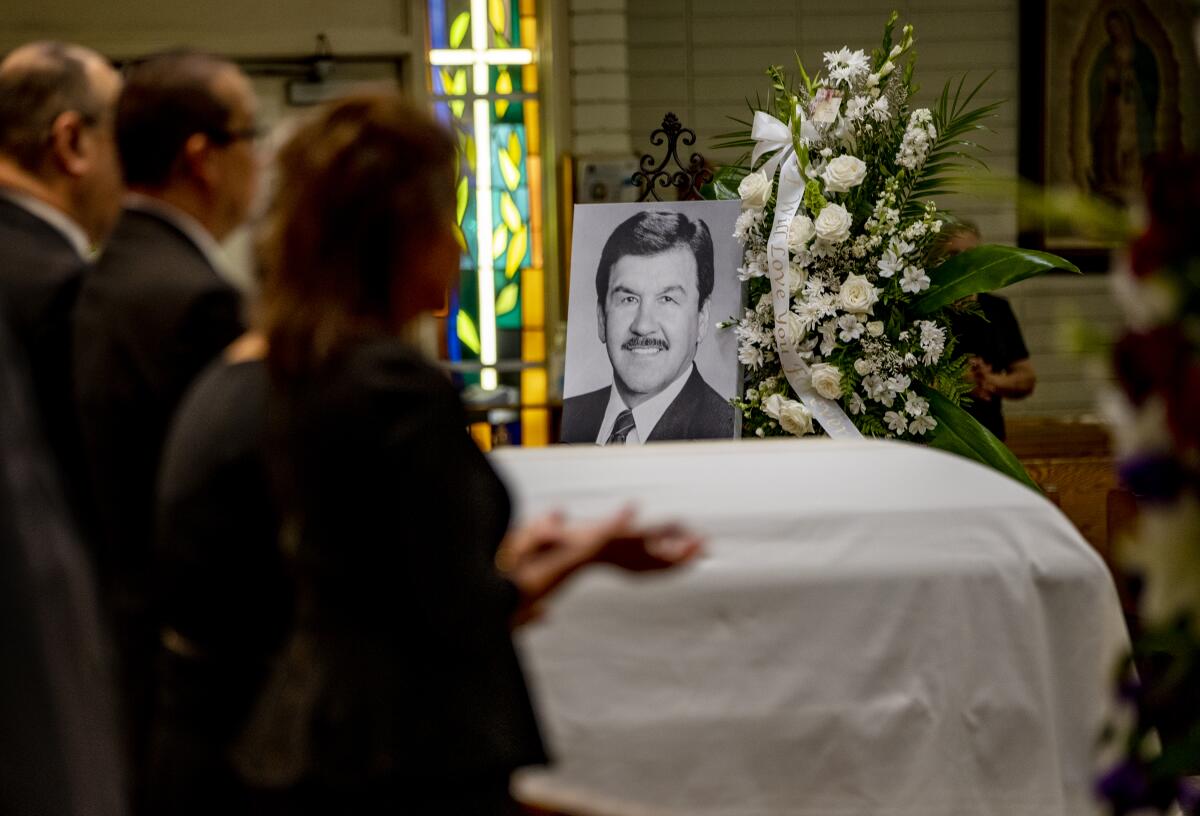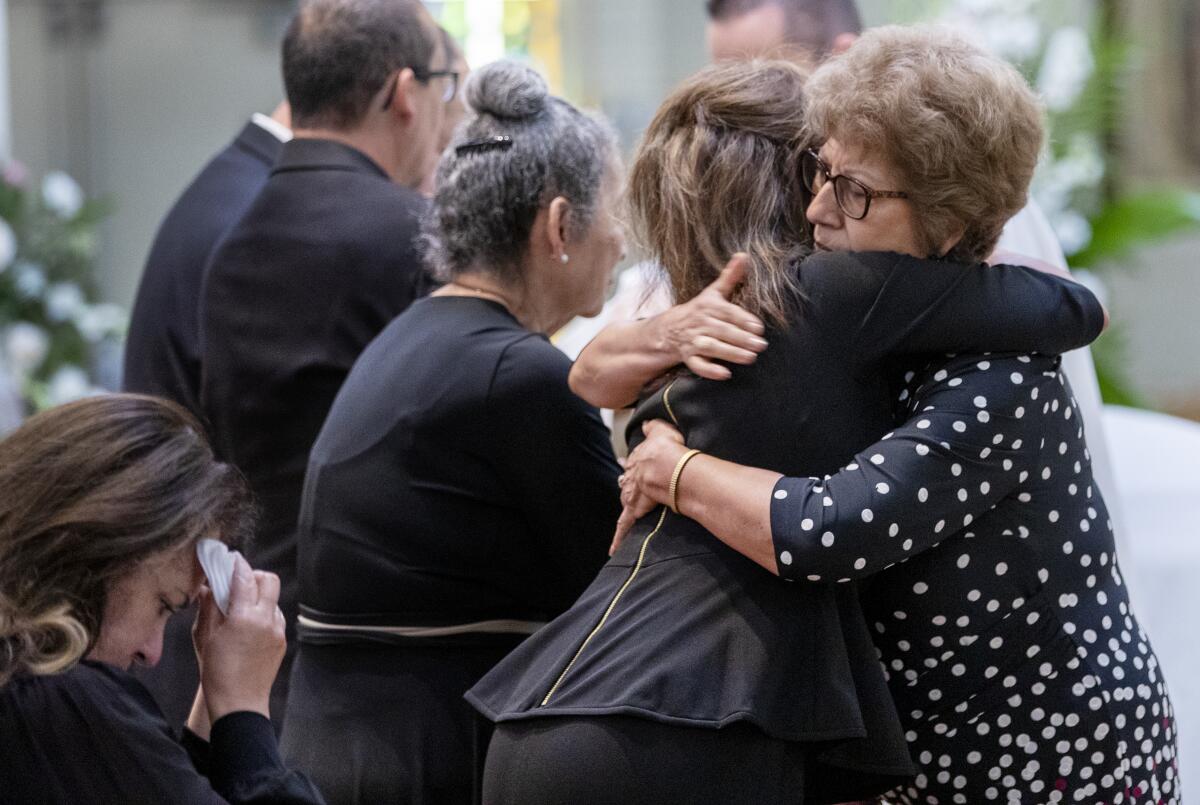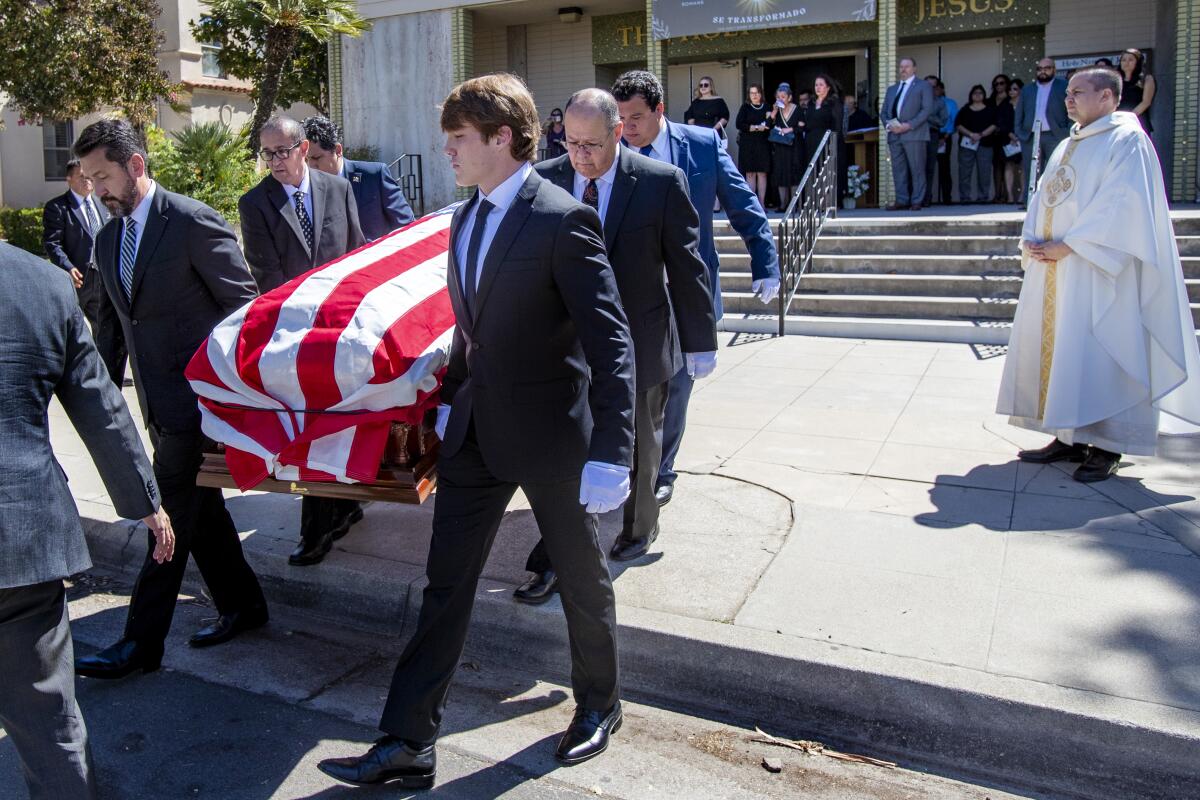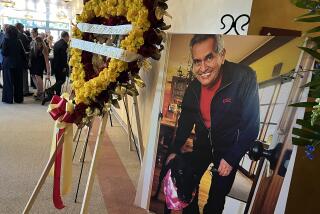Column: He helped thousands of Latino students, including me. Do they remember him?

- Share via
It was a small, intimate funeral at the small, intimate Holy Name of Jesus Catholic Church in Redlands on Monday morning. Humble, unassuming. The deceased was Ernest Z. Robles, who died of heart failure Sept. 5 at age 92.
His sons and grandson rolled their patriarch’s casket to the altar as an ensemble played Leonard Cohen’s “Hallelujah.” Nearby stood a photo of Robles from the 1980s, wearing a suit and tie, a mustache and a smile. On the commemorative program was another photo: Robles in his Marine dress blues as a young man about to go fight in the Korean War.
Friends and family members — among them five children, eight grandchildren and five great-grandchildren — packed the church’s front pews. There were eulogies praising Robles for his kindness, his love of road trips and of Friday family nights at home with pizza and champagne while everyone played billiards.
After Communion, Dora, his wife of 68 years, tearfully signed her husband’s name in the parish’s Book of Remembrance, which lists all of its faithful who have died over the decades.
It was a funeral like most others, until the end, when Mike Chavez stepped up to the podium.
He’s a Riverside Community College sociology professor, executive director of the Inland Empire Labor Council — and Robles’ godson.
“If it was my wish,” Chavez said, a slight tug at his voice, “we could’ve filled up several stadiums with people today” whose lives were transformed by his godfather.
In 1975, Robles founded the Hispanic Scholarship Fund by taking out a $30,000 mortgage on his home to help Latino students pay for college.
Today, the Gardena-based nonprofit is a philanthropic powerhouse.
It has awarded over $700 million — $33 million last year alone — to tens of thousands of students. Corporations ranging from Procter & Gamble to Anheuser-Busch, Ralph Lauren to Lowe’s, support the fund, along with celebrities from Cheech Marin to Gloria Estefan. Its alumni fill the medical and legal fields, corporate suites, Capitol Hill, education and beyond.
“To take a phrase from Lin-Manuel Miranda, people are now in the room where it happens,” said Fidel Vargas, president and chief executive of the Hispanic Scholarship Fund since 2013.
The son of Mexican immigrants received a scholarship with a personal letter of congratulations from Robles when he attended Harvard Business School in the 1990s.
“He didn’t want the spotlight. He didn’t want anyone thanking him. He just wanted to make a difference,” said Vargas, who served as mayor of Baldwin Park when he was just 26.
Another Hispanic Scholarship Fund winner? Me, when I attended Orange Coast College in the late 1990s.
The amount wasn’t much — $500 or $1,000, I can’t remember. But it came at the exact moment I needed it. The money helped pay for my classes and textbooks, and set me on the path to where I am today. It came with a letter from Robles cheering on my accomplishments while reminding me that my journey was just beginning.
I arrived early to his funeral, expecting an overflow crowd.
“I bet you he would’ve known you,” said Thomas Robles, Ernest’s son. We stood outside Holy Name of Jesus before the service began, waiting for the masses to come. They didn’t. Maybe Redlands was too far. Maybe an 11 a.m. service on a Monday was too early.
Maybe not enough people knew about Ernest Z. Robles — not even those he helped.
“He just knew everybody and their story,” Thomas continued. “‘Oh, you went to junior college. You became a doctor.’ He helped to change the world. He didn’t sign the Paris [Accords], but he did make a difference.”

Robles was born in the tiny border town of Pirtleville, Ariz., in 1931. His family moved to the Riverside neighborhood of Arlington when he was four, hitching a ride on a watermelon truck.
He attended segregated schools, then fought in the Korean War, earning a Purple Heart and Bronze Star.
After graduating from UCLA with a bachelor’s degree in 1960, Robles began a public education career in the Inland Empire that took him from counselor to English-as-a-second-language advisor to sports coach, teacher and finally, principal at Casa Blanca Elementary in Riverside — among the last segregated schools in Southern California when it closed in 1967. Even back then, he would give out $50 scholarships to his students.
A doctoral dissertation about Casa Blanca Elementary earned him the attention of the precursor to the U.S. Department of Education, which hired him to travel around the South and deliver court orders ordering school districts to desegregate.
“Dad would tell us how he’d go through the South, but he would never stay in the towns,” said Ernest Robles Jr. with a laugh. “He’d give those schools the legal papers and get out. But by doing that, he believed even more that education was the way for minorities to succeed.”
His father eventually became assistant regional administrator for equal educational opportunities for the federal government. That’s when Robles realized Latinos were woefully underrepresented in higher education at a time when their numbers were growing, which led him to create what became the Hispanic Scholarship Fund.
“The minimum goal of any society is to be able to have its population of whatever ethnicity reach its maximum potential (and) be representative in government, in corporations ... and in all these facets of society in proportion to their numbers,” he told The Times in 1991. “Hispanics are simply not there.”
The nonprofit started from one bedroom of the Robles home, then grew to more rooms until the children asked their father to rent an office. He was such a fundraising novice that executives frequently suggested that he ask for more money next time. Within a decade, corporations were coming to the Hispanic Scholarship Fund asking how to help.
Ernest Jr. remembered his father being on the road much of the time until retiring in 1998 — not just corporate boardrooms and visits to the White House to meet with Ronald Reagan, George H.W. Bush and Hillary Clinton but also small towns in the Midwest and Northeast to personally congratulate winners or serve as a keynote speaker at banquets for smaller groups.
“He lived to hear how the Hispanic Scholarship Fund had changed lives,” Ernest Jr. said before telling one story that stuck with him.
“I was training employees one day at a hotel, and a gentlemen walks in and starts to check in and saw my name. He asked, ‘You know Ernest Robles?’ ‘Yeah, that’s my dad.’ ‘Really?’ ‘Yeah.’ ‘Wow.’
“Then he went silent,” Ernest Jr. continued. “My six employees are watching. I saw his eyes water up, his voice quivered. And then he finally spoke again and said, ‘Because of him, I’m a doctor.’”
There were no stories like that shared at Robles’ funeral. Instead, Father Erik Esparza urged everyone present to remember the good work that Robles had done, citing Paul’s second letter to Timothy in the New Testament, specifically the passage that reads, “I have competed well; I have finished the race; I have kept the faith. From now on, the crown of righteousness awaits me.”
“The light that Ernest kept bright has been given to all of you,” Father Esparza proclaimed. “To not give up, to not be discouraged but to share that light with others.”

The Mass ended. Robles’ casket was draped in an American flag. A motorcycle guard outside stood at attention. A small motorcade lined up to follow a hearse to Robles’ final resting place.
On the steps of Holy Name of Jesus, Anthony Dyer and Frank Robles Martinez looked on. They were the great-nephew and nephew of Robles, respectively.
“He was the person all of our family told us to look up to,” said Dyer. “My uncles would clip out the newspaper anytime my great-uncle would come out.”
“He set the bar high for all of us,” said Robles Martinez. “He was like walking love.”
- Share via
Watch L.A. Times Today at 7 p.m. on Spectrum News 1 on Channel 1 or live stream on the Spectrum News App. Palos Verdes Peninsula and Orange County viewers can watch on Cox Systems on channel 99.
More to Read
Sign up for Essential California
The most important California stories and recommendations in your inbox every morning.
You may occasionally receive promotional content from the Los Angeles Times.












